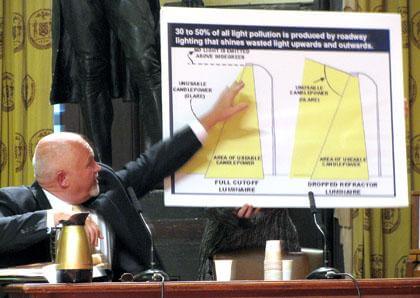By Philip Newman
The 8 percent hike now proposed for subway and bus fares will not be enough to keep the transit system running in its present state without financial help from the state, Metropolitan Transportation Authority Chief Eliott Sander told the agency’s Finance Committee.
Sander delivered that distressing assessment and the news that the MTA has fallen into a $1.2 billion hole at a special Finance Committee meeting Monday.
MTA Finance Officer Gary Dellaverson presided over a PowerPoint presentation detailing the agency’s steady loss of tens of millions of dollars in revenue from realty and state taxes with the economic downturn in less than four months.
MTA officials said that going into next year the MTA’s budget deficit totals $1.2 billion, up from $900 million in red ink in July. The agency showed a surplus less than two years ago.
Asked about the seriousness and possibility of service cuts on buses and subways, Sander said “they will be very, very significant. Whatever the mix that we come up with, in terms of fare and toll increases and service reductions, there’s no question that they would have an impact significantly, on our customers and on the functioning of the region.”
He added: “If the governor and the Legislature do not provide [financial] aid by next spring, the fare increase and fare reductions will take place.”
The purpose of the special meeting was to hear a report on the worsening figures since the latest previous such report in July, when the proposed deficit was $900 million.
The Ravitch Commission, appointed by Gov. David Paterson to come up a solution to the MTA’s financial plight, is considering a variety of possibilities, which some transit officials said includes tolls on East River bridges.
Asked about tolls on East River bridges, Sander said: “I’ve previously said that from a broader transportation policy standpoint, I’m comfortable with that, but that should not be interpreted as my support for it in this context. We are looking at that suggestion, along with many as we’ve said publicly.”
City Councilman John Liu (D−Flushing) characterized the East River tolls concept as “a lead balloon that will sink in the East River.”
At a news conference following the meeting, Sander was asked how the MTA got into such financial straits in the first place.
Sander smiled and said his wife along with some acquaintances had asked the same question.
“The 2000−2004 capital program was essentially put on a credit card,” Sander said, adding that his agency’s borrowing of some $22 billion was the largest cause of the MTA’s present condition.
The agency’s prodigious borrowing for capital projects, such as the Second Avenue subway and the East Side Access to bring Long Island Rail Road trains into Grand Central Terminal, was made necessary when the administration of former Gov. George Pataki cut off money for the Capital Plan.
As to a question of whether the MTA will now curtail or abandon the two new subway projects under construction, Sander and MTA Chairman Dale Hemmerdinger said both would go on.
“We cannot go backward,” Sander said.
Reach contributing writer Philip Newman by e−mail at news@timesledger.com or by phone at 718−229−0300, Ext. 136.


































